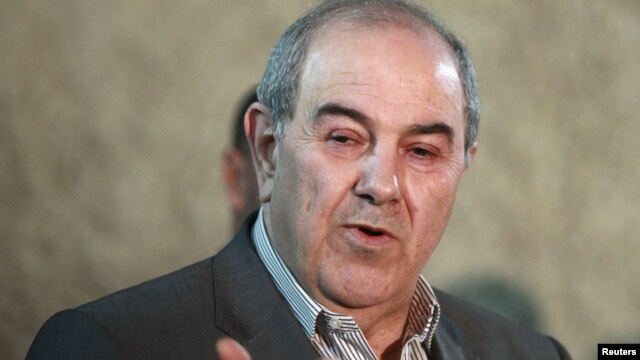Iraqi vice president denies terror charges
| Publisher | Radio Free Europe/Radio Liberty |
| Publication Date | 20 December 2011 |
| Cite as | Radio Free Europe/Radio Liberty, Iraqi vice president denies terror charges, 20 December 2011, available at: https://www.refworld.org/docid/4f1431cac.html [accessed 8 June 2023] |
| Disclaimer | This is not a UNHCR publication. UNHCR is not responsible for, nor does it necessarily endorse, its content. Any views expressed are solely those of the author or publisher and do not necessarily reflect those of UNHCR, the United Nations or its Member States. |
December 20, 2011
Iraq's Vice President Tariq al-Hashimi, the country's highest-ranking Sunni official, has denied charges he ordered hit squads to kill government officials.
In a televised news conference in Irbil, the capital of the semi-autonomous northern Kurdish region, Hashimi said he had not committed any "sin" against any Iraqi, and described the charges against him as "fabricated."
"I'm shocked by all these things and I apologize to all the families who were affected by the events reported in these confessions, and I sympathize with them," Hashimi said.
"Also to reassure the political parties affected by these crimes, which are attributed to Hashimi's security or to Tariq al-Hashimi, I swear by God that Hashimi didn't commit any sin or do anything wrong against any Iraqi, whether today or tomorrow."
Hashimi also accused Shi'ite Prime Minister Nuri al-Maliki of being behind a plot to "embarrass" him.
The comments come a day after the Shi'ite-led government announced that an arrest warrant had been issued for Hashimi, a leader of the Sunni-backed secular Al-Iraqiyah bloc.
State television aired video footage showing what the Interior Ministry – effectively run by Maliki – said were three of Hashimi's bodyguards confessing to planning and carrying out terror attacks, and receiving funding and support from the vice president.
They described planting bombs in public squares and opening fire on convoys carrying Iraqi officials.
Return Of Sectarian Violence?
The development has raised tensions between Maliki and the Al-Iraqiyah bloc, just as the United States withdrew its last combat troops from Iraq.
In a December 19 interview with Reuters in Amman, Jordan, former Iraqi Prime Minister Iyad Allawi, who heads Al-Iraqiyah, expressed fears of a return of sectarian violence.
 Iyad Allawi: Democracy "being raped in Iraq."
Iyad Allawi: Democracy "being raped in Iraq."
"In front of all the people, all the world, democracy is being raped in Iraq and undermined completely now, and we fear this will bring about a rise of sectarianism again, and more bloodshed," Allawi said. "Especially given the fact that the whole region is now boiling, as you know, and there are problems throughout the region."
Sunni Arabs largely boycotted Iraq's first post-Saddam Hussein parliamentary elections in 2005, which were followed by the large-scale sectarian violence of 2006-07.
Al-Iraqiyah narrowly won the most seats in the March 2010 polls, but failed to establish a governing majority. Following a nine-month stalemate, incumbent Prime Minister Maliki kept his post after gathering key support from Shi'ite parties.
Government Threatened
But barely a year after the national-unity government was formed, it is now at risk of collapsing.
Hamid al-Mutlaq, a member of parliament from the Al-Iraqiyah bloc, told RFE/RL's Radio Free Iraq that there were "many options. For example, we may withdraw from the political process completely in order to withdraw confidence from the government or move this issue to external parties and this is what we do not want, ever. We have suffered what we suffered and are suffering a lot, not only us, but our people also suffer."
On December 18, Maliki asked parliament to issue a vote of no confidence in Mutlaq, a day after Al-Iraqiyah announced that it was boycotting parliament to protest what it said was the prime minister's monopoly on power.
But a member of Maliki's State of Law coalition, Saad Muttalibi, said that Al-Iraqiyah's move "will not have any impact on the political process. The political process will continue." He said "60 or 70" members of parliament would uphold the boycott, but not all of them.
"At least three ministers have announced they will not withdraw from the government if an order is issued to withdraw," Muttalibi said. "More than 30 members of parliament have assured to us that they will not boycott parliament sessions, which means Al-Iraqiyah's boycott will collapse."
The developments have drawn a worried response from the United States.
U.S. State Department spokeswoman Victoria Nuland urged "all political sides in Iraq to work out their differences peaceably, politically, through dialogue, and certainly in a manner that is consistent with democratic political processes and international standards of rule of law."
Written by Antoine Blua, with reporting by RFE/RL's Radio Free Iraq and news agencies
Link to original story on RFE/RL website
